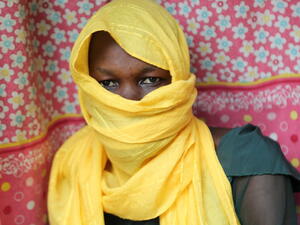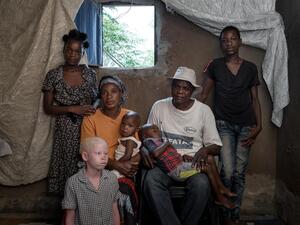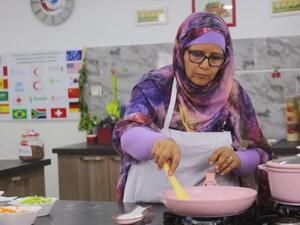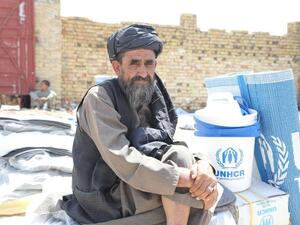Upcoming slash in food rations threatens refugees in Zambia
Upcoming slash in food rations threatens refugees in Zambia
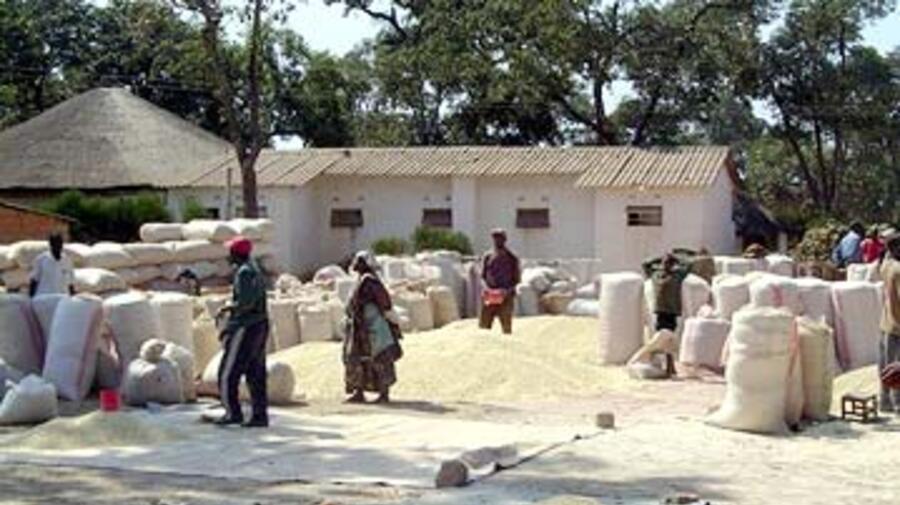
Refugees in Zambia are facing severe cuts to their food rations with a partial drought also affecting crop production of refugees in settlements who had gained some degree of food self-sufficiency.
LUSAKA, Zambia, December 23 (UNHCR) - More than 80,000 refugees in Zambia's five refugee camps and settlements could face malnutrition, triggering social problems like child labour and prostitution, unless international donors provide funds to avert a 50 percent cut in food rations scheduled to take effect in January.
The U.N. World Food Programme (WFP) warned UNHCR that it will be forced to cut food rations to refugees in Zambia by 50 percent starting in January 2006, with a complete halt by March, unless donations are made immediately. WFP has so far not received any donations for the 2006 Zambia programme.
Ahmed Said Farah, UNHCR regional representative in Zambia, said a sufficient food supply was crucial to ensure that refugees lead a normal life and shortages would threaten their protection, nutrition and health.
"There will be increased morbidity, mortality and stunted growth," Farah said. "There will be increased social problems - such as prostitution and child labour - and refugees may become uncontrollable as a result of the food cuts. UNHCR shares WFP's concerns and fully supports its call for funds so that we can provide adequate food rations for refugees in Zambia."
WFP Country Director, David Stevenson, at a donor briefing in Lusaka on 9 December revealed that not a single contribution had been received toward the Zambia food assistance project covering 2006/07, and said there was very little carry-over in food stocks expected from the current year.
"Therefore, without immediate cash donations, WFP will be required to cut food rations by 50 percent from 1 January 2006. Taking this into consideration, food will then run out completely in March 2006," said Stevenson. "This is critical, especially in a drought period."
Home Affairs Permanent Secretary Peter Mumba, during the same donor briefing, appealed to donors for urgent funding, explaining that the food crisis, if not averted, could imperil national security.
"Lack of food may lead to riots and other security incidences by refugees in the camps," he explained. "We therefore appeal to you, our donors, to come to our aid again as you have always done."
WFP and the Government had signed a new Refugee Food Project Agreement on 8 December, covering 2006 and 2007 with a combined budget of US$17.9 million, of which US$9.8 million is for 2006. There will be a carry-over of only 2,500 tonnes of food from this year's supplies while needs next year are 18,460 tonnes - a shortfall valued at US$8.52 million.
The programme applies to refugees in the camps - about half the total number of some 160,000 refugees in Zambia. Most of them are Angolans and Congolese. The rest live in urban areas or have settled among Zambians elsewhere.
The partial drought experienced by Zambia during the 2004-05 agricultural season has exacerbated the already desperate situation of refugees, especially those in Nangweshi, Kala and Mwange refugee camps in the northern and western parts of Zambia.
In these camps, the whole population depends on food assistance for basic requirements. Though some refugees have small gardens, the overall lack of farmland for refugees means they do not have meaningful supplementary food supplies of their own.
Even centres like Meheba and Mayukwayukwa refugee settlements - where refugees have access to agricultural land and some have been weaned off rations after attaining a modest self-sufficiency - may need food assistance during this lean period because of the lack of rain.
A joint WFP/UNHCR rapid food assessment mission to Mayukwayukwa from 6-12 December examined the impact of the 2004-05 partial drought on crops in the settlement to establish if food assistance was needed, and for how long. It found crop production had indeed suffered.
Affected refugees have been forced to find additional forms of income, which has put particular strain on the disabled who have to travel long distances to find casual work. Furthermore, they are spending less time in their own fields as a result - which may well have a negative effect on this season's production.
In any case, with all of Zambia now facing a cereal deficit, it may be impossible to find food through work in nearby villages. If desperate refugees turn to stealing food from the fields of others, the generally good relations between refugees and their hosts will be undermined.
The WFP/UNHCR team presented their report on 14 December, saying it was imperative that refugees who had been weaned off rations be brought back into the feeding programme for at least three months, to see them through to the harvest in May 2006. This would enable them to increase their harvest as well as give better nutrition. These households also need help with agricultural inputs to raise yields.
UNHCR's fears about the impact of reduced rations are grounded in past experience. Refugees received full rations in 2005, but only after disruptions the previous year. When rations of maize and pulses for refugees in Zambia were cut in half in November 2004, refugees rioted in Kawambwa and attacked UNHCR and NGO vehicles. Several staff were injured, and the rest had to stay away until calm was restored by security personnel.
Cuts in rations also led refugees to leave camps in search of income, to make up the shortfall. Some refugees were detained by authorities for staying outside the camps without permission. In addition, children and women became more vulnerable. Prostitution increased, school attendance dropped and the health and nutritional status of children in particular was threatened. There are fears that, unless funds arrive quickly, the situation in 2006 will be worse.
By Kelvin Shimo in Lusaka, Zambia

